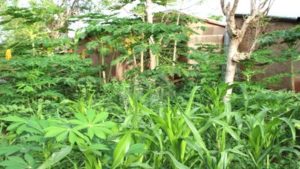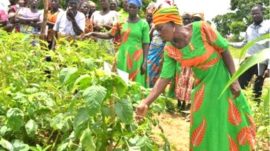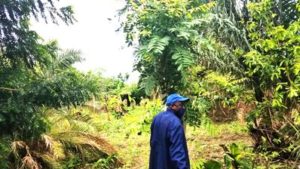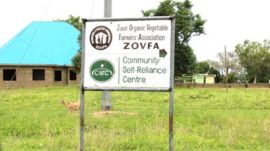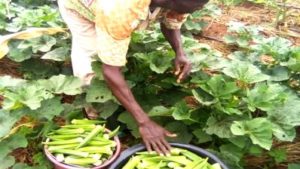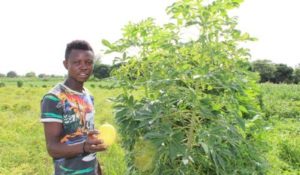Agroécologie Afrique de l’Ouest
– Ghana –
Agroecology in Upper East and Northeast Region, Ghana
CIKOD
(Center for Indigenous Knowledge and Organizational Development)
CIKOD is a non-governmental organization based in Ghanaan working to build resilient communities in the Upper West Region and championing development through endogenous approach.
You can find more details on the 6 spots presented below which develop agroecological activities
in the PDF CIKOD article :
Upper-East and North-East Region of Ghana
And their location on the Google map at the end of the article
District: Nabdam, Gundoug
Fuseini Bugbon, an Agro Ecologist from Gundoug
Mr. Bugbon farms four (4) impressive acres
Trees were the first things he planted. They were fundamental to the transformation of this formerly barren land : cashew, mangos, pawpaw, guava, and moringa, two coconut trees and lots of cocoa trees.
Mr. Bugbon has crops of maize, cassava, banana, sweet potatoes, sorghum, groundnuts, pepper and rice.
He also cultivates traditional vegetables such at bitto, ayoyo, and samvama. On his farm you will also find coco yam and water yam. The diversity is awe-inspiring.
“If the soil is not alive, we will not be alive”
Similarly,bees, sheep, goats and guinea fowls are all integrated into his farm.
District: Bongo, Community: Asaloko
50 Women groups in the Asaloko community in the Bongo District of the Upper East Region have been empowered by the CIKOD (Centre for Indigenous Knowledge and Organisational Development), an NGO to go into indigenous vegetable farming to help improve upon their nutritional status and economic livelihoods.
See more :
Women groups in Asaloko empowered to go into vegetable cultivation
District: Bolga East
Mr Joseph Abarike Azuma farms approximately four to five acres. His organic farm utilizes many agroecological practices. For example, he inter-crops maize and bitto. He also grows cassava, okra, garden eggs and five varieties of sweet potatoes.
The large number of trees on the farms demonstrates Mr. Abarike’s incorporation of agroforestry.
Sharing knowledge about organic agriculture is Mr. Abarike’s passion.
District: Bolga East
The Community Self Reliance Center emerged from Zuuri Organic Vegetables Farmer Associations. Currently, 59 communities of 30 to 35 members are located in the districts of Bolga Est, Bongo, Nabdam and Talensi. The majority of members are women.
The Community Self Reliance Centre promotes organic agriculture.
Their training includes compost making, use of manure and sea weed (as an organic fertilizer).
To promote agroforestry, it also operates four tree nurseries (mango, mahogany cashew, and acacia).
District: Walewale
CEAL (Centre for Ecological Agriculture and Livelihood)
Over the past three years, CEAL has worked with over 3000 farmers.
The CDAL way to raise awareness and train new farmers in agroecology :
They train one farmer from a community to agroecolgy and supporting that farmer to then train another 10 persons in their respective communities.
When successful this model generates 100 persons per community who has had training in agroecological agriculture.
Given the importance of soil, in agroecological farming, CEAL has focused its training on soil amendment and on different types of composting.
CEAL also promotes agroforestry and how it is good to integrate trees into cultivated land.
CEAL does it himself on his 6 acre farm
CONTACTS et LIENS
– Address : North East Region, Ghana, P O Box 13, Walewale
– Tel : 050 43 95 442 // 054 91 32 599
– Email : infoceal2016@gmail.com
– Site : https://www.cealghana.org/
Community: Karaminga
Ibrahim Salifu, farmer
On his seven acre farm, he grows maize, okra, pepper, melons, pawpaw, bitto, ayoyo, sweet potatoes and other crops.
Mr. Salifu is very interested in the synergy between plant production and the life of other animals and insects. So he places great value on the work of termites, bees and his guinea fowls.
He is used to keeping a large area “uncultivated” to allow medicinal herbs and other “wild” plants to grow
As an organic farmer, Mr. Ibrahim Salifu is particularly concerned with producing his own healthy seeds.
CONTACTS et LIENS
Bern Guri, founder and executive director and the Africa Food Sovereignty Alliance coordinator.
– Mail : guribern@gmail.com
Wilberforce Laate, deputy executive director (southern ghana)
– Mail : wilraby@yahoo.com
CIKOD (Center for Indigenous Knowledge and Organizational Development)
– Office address : PRQF+FHV, Oyarifa White House, off Accra-Aburi Road Opposite K OFORI Ltd Accra-Oyarifa, Pantang West, Ghana
– Tel : +233 (0) 302 518 045 // (0) 501 322 900
– Mail : dbanuoku@cikodgh.com
– Facebook : https://www.facebook.com/p/CIKOD-100064818545748/
– Site : https://cikodgh.com/
See also other agroecological actors in West Africa
In Ghana and also in Niger, Ivory Coast, Togo, Mali, Burkina Faso, Benin and Senegal
The Google Maps
On the map, choose an icon (then “more info” on mobile). You will find notices with contacts (when we found them), links, photos and sometimes videos.
